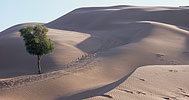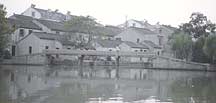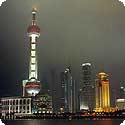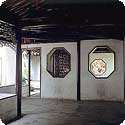Category: 游记Travel Records
2006/06/14《响沙湾游记》Toward Xiangshawan Sand Dunes
I am sitting in a bus waiting for it to leave for the sand dunes. Just an hour ago I wandered around this outdoor station, checking out the numerous buses and its destinations and asking people for directions to 响沙湾Xiangshawan. As always, there was a rhythmic stream of 摩托车motuo (motorcycle) drivers ready to help me to get to my locations. "There are no more buses to Xiangshawan, the last bus was long gone. I can give you a ride there." Then he handed me the hard hat. The fare was 20 yuan; but I have a limited budget and more importantly, the distance is too long to be comfortable on a iron pony. So I decline, "I saw the schedule on the blackboard. There is one last bus at 4:00. I'll just wait." To avoid the hot sun I went back inside the station, where a few young locals are playing billiards in the back waiting room, which would otherwise be empty. In the main room is a dry food store, and there I looked through the shelves and finally decided on a bowl of instant curry beef noodle for my lunch. The woman poured hot water into the thin bowl from one of the several thermos by the wall, and I ate it without thinking — it must have be my 39th bowl.
I sat on the steps and wondered at the buses, none seemed to have moved. All the men stayed in the shades and smoked; and the women were either inside fanning themselves, or outside selling all sorts of fast foods, wearing their white wide-brim hats. As I had nothing to do I took out my notebook and began to jot down what had happened: This morning I was still at 希拉穆仁草原Xilamuren Grassland enjoying the sun rise, and at the same time suffering from my ger's thermo of hot water that had a stubborn residue of goat odor. I got back to 包头市Baotou city's 东河区Donghe district at 1:30 in the afternoon. I had planned to drop by the sand dunes for a quick look, so as soon as I was back in the city, I registered a room and then immediately headed out for the bus station. But I had no idea on how to get to the desert and, apparently, neither did the clerk nor anyone else inside the bus station. I carefully checked all the schedules and locations mapped on the wall but no recognizable names came up. On the city map it is located not far south of Donghe, but there is no travel information on how to get there, only a short description hailing the attraction as a phenomenon because it is the closest real desert (with sand dunes) to a city. I had passed through the deserts from 新疆Xinjiang to 甘肃Gansu — all bare and flat — but I had not set foot on a sand-duned desert. So I wanted to check it out. After pacing around the ticket room for some time, I decided to try my luck with the drivers outside. Now I have options. A driver going to 东胜Dongsheng said he could drop me off 6km from the desert. But 6km is too far for an area that I know nothing about, and the fare was 25 yuan — the full fare to Dongsheng. Another driver offered a better way: For 9 yuan his van will take me to 达旗Daqi; from there I can take the public bus to Xiangshawan. So I hopped on. 45 minutes later, he dropped me off and pointed the direction to the town's bus station, which is just several blocks around the corner. In this station is where I have been waiting for the past hour for that last bus to see nature's wonder.
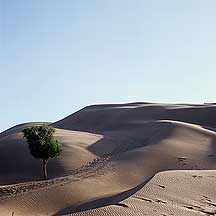 At
close to 4:00 my bus wheels in through the side of the building. I get
on and sit on a seat behind the first. "When will we start moving?" After
the long wait and time slipping away, I want to get going. The driver
turns to me, smiling, " soon. We still have time." "And how long does
it take to get there?" "About half an hour." "When is the last bus at
the desert?" "About 6:30. I'll wait for you. Not to worry." Then he steps
down the bus and goes somewhere. Meanwhile a father pulls up two colorfully-dressed
little girls onto the seats in front of me. Without a word he walks away.
The girls look about 3 - 4 years old. From behind I could not see them,
their tiny figures are consume by the seats, but I hear giggles and gleeful
voices. As the minutes tick, more people get in, along with a few large
bags drag onto the empty area behind the driver's seat. The father comes
back with two red-bean ice bar, and the little girls start nipping it
happily while the father disappears again. Half an hour passes and a lot
of noise inside now — but no sight of our driver. I feel a little
regret at not taking that iron pony; I would have been there by now. Amid
all these the driver jingles back onto his seat. Immediately he lights
a cigarette, then slips out his cell phone to make a call. He looks to
be in his mid-thirties: Has a tough sandblasted skin — almost red-brown
— that must be due to the shadeless plains here. His hair is cut
short and sticks out like the mobs of plants sticking out of the sand
plains. On him are a red t-shirt, a short pant, and a pair of rubber slippers.
At
close to 4:00 my bus wheels in through the side of the building. I get
on and sit on a seat behind the first. "When will we start moving?" After
the long wait and time slipping away, I want to get going. The driver
turns to me, smiling, " soon. We still have time." "And how long does
it take to get there?" "About half an hour." "When is the last bus at
the desert?" "About 6:30. I'll wait for you. Not to worry." Then he steps
down the bus and goes somewhere. Meanwhile a father pulls up two colorfully-dressed
little girls onto the seats in front of me. Without a word he walks away.
The girls look about 3 - 4 years old. From behind I could not see them,
their tiny figures are consume by the seats, but I hear giggles and gleeful
voices. As the minutes tick, more people get in, along with a few large
bags drag onto the empty area behind the driver's seat. The father comes
back with two red-bean ice bar, and the little girls start nipping it
happily while the father disappears again. Half an hour passes and a lot
of noise inside now — but no sight of our driver. I feel a little
regret at not taking that iron pony; I would have been there by now. Amid
all these the driver jingles back onto his seat. Immediately he lights
a cigarette, then slips out his cell phone to make a call. He looks to
be in his mid-thirties: Has a tough sandblasted skin — almost red-brown
— that must be due to the shadeless plains here. His hair is cut
short and sticks out like the mobs of plants sticking out of the sand
plains. On him are a red t-shirt, a short pant, and a pair of rubber slippers.
I am frustrated. Since 1:30 I have been trying to get to the sandy desert. Now I am still 15 or so kilometers away. And I have to get back to Baotou tonight. I look out the glass window in a fit of boredom. A woman with a white wide-brim hat suddenly appears carrying a white cooler box. She looks up to me and immediately the lower half of her face shines. A slight smile carves across her plain round face while in the shade a set of lustless eyes sinks there. She asks for the millionth time, "want one?" I hand her half a yuan and reach down into the box for one. I unwrap my cheap plain ice bar and finish it in a few bites; then toss the stick out the window. The two kids are bouncing their feet and probably still licking theirs. Our driver is now on his third call, and the third cagarette as well. He laughs a bit and sips a few times on his jar of red tea. Finally, he claps his phone and starts the engine. It is now 4:50. Once on the highway, the bus speeds up. In twenty minutes we are off the highway and turn into a village sparsely filled with block-type concrete houses. Here the bus bounces through the narrow earth road that undulates forever. On the roadside are tall and slender poplar trees, and beyond them are farm fields. Very soon Mongolian gers and cattles pop up here and there. As the bus wiggles onward, it made several stops along the way. At one stop a woman waits on the side and waves. Bus halts and door slams open: The driver sticks out the window and murmurs through his cagarette, " where to?" " No, no. I am picking up my girls." He turns back in as the two little girls jump out of the bus. "Yours?" The woman smiles, then takes the girls' hands and together walk toward the distant houses.
As the bus moves deeper and deeper into the interior, sand becomes more abundant. In no time the huge dunes pop into view, behind a thick row of trees. A little later, we trail behind a line of construction vehicles — and these machines just crawled bearing an unbearable load. At last one of them in the front stops totally. I stick my head out the window to see what is going on, but I gain nothing but a surprise blast of sand on my face. As the people inside complain aloud, the driver sticks out his head and yells ahead, "what is happening!" No one knows. After ten minutes, I spot a man appearing from behind a high pile of sand. He gleefully climbs up the truck and get it moving. Apparently he is responding to nature's call.
In time we reach a wide field of sand and gravel just half a kilometer from the sand dunes; and here the bus grinds for another 10 minutes before halting in front of the entrance. I get off the bus and look up. A certain feeling of revelation encapsulates me as I wonder at the dark wall of sand rising some 30 meters high. And as something I see for the first time, I can't help romanticizing its body of smooth curves rolling endlessly to the horizon, a body lying in wake of constant manipulation — by nature, by thoughts, by civilization. So I let my eyes roll on earth in its nudeness. By now the sun has nearly drop to the dunes, so its entire eastern sides are in shadows. Surrounding the foot of the dunes is a metal fence that goes quite a long way. By its entrance gate is a simple shack where a staff, in police uniform, sits inside smoking. He tells me what I ask for: 30 yuan for the ticket and 25 yuan for the cable lift up; or, if you feel like a hero, you may climb up by yourself instead. I look up at the glaring dunes, trying to follow what little footpath there is up the steep slopes. Hardly any visible path: Any sign of it is indicated by a rope and a line of small triangular color flags leading up to the top. A few young tourists are braving up slowly, climbing like a few tired bears; and following parallel to them, like shadows, are a few local women who continuously wave their water bottles in front of the climbers hoping for a sale. The staff watches as I walk back and forth. I seem to be the only one standing here, so a few locals come up to me asking if I need a room tonight; if not, how about a ride on a horse or a camel. I had ridden them both not long ago, and right now I am not in the mood for them. The third time I pass the shack, the man ask aloud, "how is it?" But I still don't know. Should I stay overnight or leave right away to catch the bus back to Baotou. Then the bus comes round to me and the driver leans out the window, "I am ready to leave, are you coming?" I remind him that it is still half an hour til 6:30. "It looks like there will be no people returning, so I am taking an early break." I am really piss, I waited 2 hours for his bus to leave and 45 minutes to get here, now 10 minutes is all I have with the sand dunes. So I wave him away.
Now I am stuck. If I go in now I would have too little time to look around. And if I stay overnight I am not sure whether it is worth my time. I take a slow look at the whole area to see what I can do in a short time. To the left is a tall hill where a few hotels and tourist gers sit on its foot, slope and summit. The hill ends in a sharp cliff and appears to be higher than the dunes, so its summit would likely offer a sublime view of the desert. But it is too far. On the right, I follow the dunes to where it ends in a round turn. No one would likely go there and it seems to offer more options; I may even be able to step onto the sand a bit because the fence would likely end somewhere there. And it is on my direction out of this area. So I made up my mind to leave and head to the dunes' end.
I quickly walk away from the main area. On the way I take a few quick frontal shots of the dunes. And seeing it whole there is something very tragic about this pile of sand that is trapped in a natural cycle of rise and fall, and whose shifting state renders it homeless.
Cutting across the scene are the cable wires and its dangling chairs. On the chairs the view must be great; but from my perspective it is damn ugly. There is no doubt to me that civilization offers the greatest damage to nature. At last I reach a section where the fences had thinned out. I jump right on it. The sand feels good. I thought of climbing up to get some surprises. But that will take too long and I am afraid I will miss the bus. After a few shots I head out. I have a long way to go - 6 kilometers to the main road I thought, maybe less. But luckily I meet a farmer with a motuo bike. "Hey, need a ride?" "No. I can walk." "It is some distance to the town. It will be midnight before you reach it." "How much do you want?" "15 yuan." "No. 10." "You bastard, I can't get a good pack of cigarrette for 10." We settle on Y12 and hop onto his red iron pony to leave. I have 20 lbs. hanging on my shoulders and my tripod on one hand while my other grap onto the bike's rack in the back. My body arches forward and tilts backward as we bounces up and down the rough road. I am sick of this. "Where are you heading from the bus station?" "Back to Baotou." "You can catch the bus in the highway, it is much faster. I will show you."
Once we are out in the main road he speeds away. Soon we reach the underpass of a speedway where we stop and get off. He then climbs up a steep and honeycombed concrete slope to the speedway. There he waves for a bus. "I see a bus coming. Come quickly up here," he yells. I am a curious person so I want to know what's up there. I have one free arm but I manage to haul myself up and then over the metal fence. And the cars just zoom pass us at 50 miles an hour. As soon as the bus gets close the farmer jumps and waves, but it just ignore us as if we are two roadkills swept to the side. "Don't worry, the next one will stop." After one more jump, I have enough. It is ridiculous and clearly he just want to get rid of me here instead of going all the way to the town. "I am going back down. I want you to take me all the way to the station." "Wait! Give a few more minutes." But he soon follows me down. Then he plays with his bike, turning the engine on and off. "No good! It is not working." What a lame excuse, I thought. As the farmer continues his desperate show, I look toward the road waiting for signs. And a bus comes my way. It stops. It is a local public bus and the fare is 2 yuan. I get on and take out 10 yuan and hand it to the farmer, who now stood by the doorway. Well, he will have to settle for cheaper cigarrettes now.
I tell the bus driver that I want to get back to Baotou so he can drop off me on the nearest stop. "Don't worry. There are still buses to the city. The last one should be 8:30." Now I feel better. Some stops later I get off and wait for the bus. It is 7:20 and already getting dark. After half an hour pass and still no sign of anything, I begin to wonder if this is the correct waiting area. It looks to be a main road in the town with two long and wide lanes going in the opposite directions. But the area is quiet. Most of the businesses here are auto repair shops, so cars fill the side walk. I spot a food store and go in for a bowl of instant curry beef noodle. As I squat eating it, a man comes over and asks where I am heading. "To Baotou? No! If I knew you were waiting for the bus to Baotou I would have long told you that the last one had gone for the day." "There should be one more at 8:30." "Trust me. There is no more. See those people in my car, they are all heading to Baotou." He points to a taxi parked on the side walk by one of the repair shops. Inside three people sit like 罗汉luohans waiting for enlightment. "If you get in now, I will have enough people and we will leave right away. Just 25 yuan. How about it?" “How about 15 yuan." "This is a taxi, not a bus, we will get to the city in half an hour. Don't skimp over a few yuan." At this time I really don't care how long the ride takes, I want to be comfortable - I don't want to be squeezed like pickles in a jar. So I ignore him. After him another man comes along with the same proposal. This time the fare is lower: 20 yuan. Unfortunately he feels slighted at my offer of 10, a price that I think is fair for his minivan. Minivans are popularly known as a 面包车mianbaoche (literally, a bun vehicle) - a name which may have its origin in 香港Xianggang (Hong Kong), whose citizens called it so due to its resemblance to the shape of a loaf of bread; but its original name referred to a much larger van, and as time went the name got stuck to all small vans. Along with me is another guy waiting for the same bus. He carries nothing, so I assume he is a local. Like me, he is not tempted to leave by any means other than a bus.
By 8:30 there is still no sign of a bus. So I buy myself an ice bar
to keep busy. The taxi had left when the lucky driver got hold of another
person, but the mianbaoche driver still sits in his van smoking. Once
a while he calls us to go, but we just ignore him. Another 15 minutes
passed I am on my second ice bar, and this time I treat myself to one
filled with red beans. And under a lamp I squat, eat and wait. Above,
the Great Bear reaches up in the low Inner Mongolian sky, and in a flat
dark corner the lone Wolf stares widely. And I continue to wait. From
a minor street about a rock's throw away, the bus makes a right-angle
turn toward us and stops. I hop in and wave farewell to mianbaoche driver.
![]()
